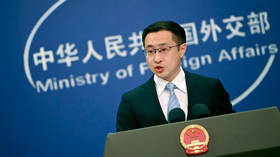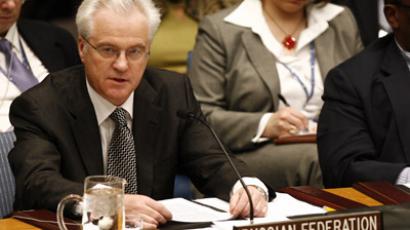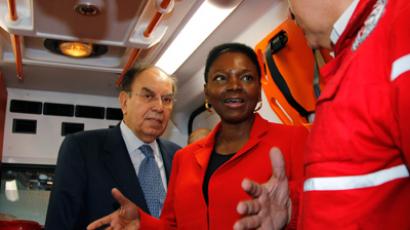Many Syria solutions but little agreement in out-of-sync UN
UN Secretary General Ban Ki-moon has pleaded for a divided Security Council to "pull back from the brink of a deeper catastrophe" over Syria. But as violence continues to tear apart the Middle Eastern country, diplomatic unity is nowhere to be found.
With the US, Europe and most Arab states on one side, and Russia and China on the other, the two camps stuck to their guns during the ministerial council meeting.The Secretary General urged the sides to agree on a united resolution condemning the Assad regime. Russia and China, who have veto power in the Security Council, had previously rejected two proposed UN Security Council resolutions accusing president Assad of instigating the violence.Moscow and Beijing branded the resolutions as “unbalanced.”During Monday's meeting, US Secretary of State Hillary Clinton said her country doesn’t “believe that sovereignty demands that this council stands silent when governments massacre their own people, threatening regional peace and security in the process”. Russian Foreign Minister Sergey Lavrov agreed that Syrian authorities “bear a huge share of responsibility'' for the bloody conflict. However, he dismissed “making hasty demands for regime change, making calls in support of armed confrontation, and even foreign military intervention” as “risky recipes of geo-political engineering”. Lavrov also said the Western approach to the situation in Syria could only result in the spread of conflict.Russia and China reiterated that they will not back any resolution that does not demand a ceasefire from the opposition as well as government forces.China's UN ambassador Li Baodong said: "China is against interference in internal affairs in the name of humanitarianism. No external parties should engage in military intervention in Syria and push for regime change."After the debate at the UN, Lavrov had separate discussions with Clinton, as well as the British and French foreign ministers. The diplomats held private meetings concerning the Syrian crisis in a move to find a common solution which has thus far eluded them over the past year.After 40 years of rule by the Assad family, mass protests against his government erupted a year ago. The UN says more than 7,500 people have died in the conflict, and on Monday Ban Ki-moon laid the blame clearly at the door of President Bashar Assad, accusing him of using “disproportionate force” against his own citizens.From the outset of the conflict Russia has shied away from accusing Assad of being the sole perpetrator of internal violence. On Monday, Lavrov said that Assad’s regime is up against “combat units of the so-called Free Syrian Army and extremist groups, including Al- Qaeda, which have committed a string of bloody terrorist acts recently."Russia and China also fear that any UN resolution passed ostensibly to protect the rights of ordinary Syrians could pave the way for foreign-orchestrated regime change in the country. Lavrov accused the West of using the pretext of establishing a “no-fly zone” in a previous UN resolution to carry out “mass air strikes” on Libya last year. Referring to the impact of Libya on any future resolution, he stated that "whatever the goals are, they cannot be achieved by misleading the international community and manipulating UN Security Council decisions."
Cairo Solution
Although the views of the Security Council’s various members might never coalesce, the solution may be a pragmatic compromise. Sergey Lavrov met with the staunchly anti-Assad League of Arab States in Cairo over the weekend.After a tense meeting, the sides emerged with a five-point short-term plan for Syria. Its main conditions were the violence must stop immediately, no foreign countries will intervene in the conflict, and a mission by former UN Secretary General Kofi Annan must play a central role in resolving the stand-off.The plan has been welcomed by China and on Monday Syria’s ambassador in Moscow also hailed the initiative.With such backing Annan visited Syria over the weekend, but did not leave with concrete promises to stop the violence. Nevertheless, the special envoy said he was “optimistic of a resolution.”
‘NATO reluctant to get involved in Syria’
Alistair Dawber, foreign editor at the Independent newspaper, believes that a number of negotiations, including some that involve the Arab League, are possibly taking place at the UN Security Council on how to resolve the Syrian crisis. “But I think NATO is very reluctant to get involved in Syria, not least because it will be a hugely difficult conflict, much more difficult than Libya,” he told RT “And, of course, the criticism that NATO has come under after the Libyan conflict has been pretty harsh”.Dawber admitted that the downfall of the Assad regime could have a destabilizing effect, but also noted that “the risks of what follows Assad is certainly one thing, but it’s quite arguable to suggest that the risk that he stays as the incumbent is even greater”, as the analyst considers Assad to be the aggressor in the conflict.













